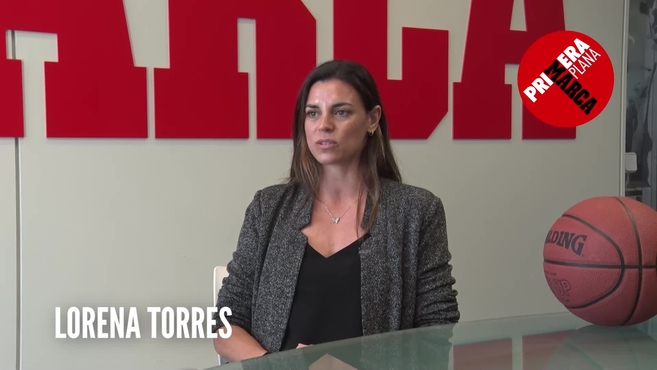HShe has already declined up to four offers from Manchester City, determined as she is that her profile as an expert in sports performance finds a definitive niche in Spain. “I’m stubborn, I don’t give up,” says Lorena Torres (Ibiza, 1981) in the conversation she has with Primera Plana. And the synchronized swimming that I practiced years ago would not explain that attitude by itself… but it would help to reinforce it: “Associated with a sport that is very hard mentally and physically come values of perseverance, discipline, self-improvement or effort that perhaps have been left behind.” my personality. I am a woman in a world of men, but I continue, I struggle, I try… In Spain they told me that I was not going to arrive because I could not be in a men’s locker room and it turns out that in the United States it is not that I have been, but that I was in charge of the performance department and I have worked with players like Parker, Ginobili, Boris Diaw, Ben Simmons, Embiid or Tobias Harris“.
Yes, Lorena went through the NBA. Four years on the Spurs and two on the 76ers. With different roles, too. “In San Antonio I was focused on sports science, looking for technology for ‘tracking’ during training and collecting and presenting the information to easily reach players and coaches.. Make the complex simple, finally. Philadelphia enlists me as a leadership figure. Less executor, not so much in the physical preparation room or on the track as creating a project for the future, a work philosophy that identifies the franchise”. It is, in any case, a League that does not recruit the first one that passes: “I come to the NBA because a colleague of mine finds work there. I go to visit the club, I present a project, they like my profile and they give me a chance. I start with a very ‘job’ role: physical trainer for young people, putting on the vest or the sensor… but in the United States it is true that they give you opportunities. If they see you as talented, they help you and promote you.”
You have to educate the player to make him the best possible professional
And what was that profile to which Torres alludes? The specialist in High Performance and Sports Sciences. “I did INEF, three master’s degrees in sports performance and the doctorate was a turning point because I started with research and knocked on many doors…” Before reaching the present moment, and after the American League, another journey must be cited : “I came to the national team because Sergio Scariolo has seen in the Raptors how they work in the NBA and then he doesn’t care about the gender of the person. He knew what my role meant and went out of his way to help me. and because he was part of the team, in the same way that Ettore Messina established the figure of the director of performance when he returned to Italy”.
A figure, the one that occupies us in this report, with which, with few exceptions, the Spanish clubs do not have -“I wanted to contact some when I returned to Spain and they have been too busy, when I was not even asking for a job”-, but the one that the agency You First bets now: “I have always been on the team’s side of the table, trying to help my players and my organization, but I return from the United States, I see how the sport is here … and It is gathered that he presented the project and that they already had something like this in mind. It has been like hunger and the desire to eat. It is new for the agency and for mebut what matters is the player and it will be a bit the same”.
Lorena is used to summarizing what her work consists of, but she continues to do so with passion: “It is a job of leadership and coordination. It goes through detecting what needs a player may have in order to try to provide him with the services, the means, the processes… whatever you need to get the best version of yourself. I take care of everything that is the performance off the track or off the field, that for the inside are the coaches: how are you eating, how are you resting, how are you sleeping, what are you doing in physical preparation, what are your workloads like… it’s a bit like having a holistic view of performance and detect if you need a nutritionist, if you are not seeing enough with the physio, if you are not doing your injury prevention exercises. In short, educate the player to make him the best possible professional.”
I take care of the performance outside the track or field, the coach is already inside
And that, in reality, is the work of everyone around him: “It may be that at first there is reluctance, but I am not inventing anything. The players who want to do things outside the club are already doing them. I have passed through two good franchises, with resources and a work culture, and even so many players look for their satellite teams to reach where the club does not reach. There is a demand with the concern of being better. A role like mine, inside or outside , ensures communication with professionals. I am trying to contact physical therapists, nutritionists, biomechanical laboratories or doctors to have that ‘networking’. I don’t know what I’m going to find because I started recently, but it’s the future. The smart thing is to understand that the important thing here is the player, to work in coordination”.
And, already put, understand that the education of the player is not an expense, but an investment: “An article by LeBron James about the millions a year that was spent on his staff is famous. Well, it has not gone bad! If you win x because you live from this, in no case can you see it as an expense. It’s like if you have a racing car and you don’t look at the oil. It’s about your physical and mental chassis. And It cannot be that the clubs do not see that, with what their squad costs them, a part of the budget should be directed to having the best to attend to those players. With injuries you lose money but, in addition, that you play the game on Sunday does not necessarily mean that you are influential in it.
Torres specifies the process that brings him closer to each athlete: “The agent detects a series of them that can benefit from my services. You First is a top agency [especialmente ftbol y baloncesto], so you make a selection. I have a very complete interview with them, I detect needs, I create those satellite working groups around… With many I am having specific talks about sleep, one of the most difficult performance supports in sport due to schedules, travel, post-game hormones or mental stress.. Sleep for me is the pillar of recovery.”
The information cannot be a limitation for the performance of the athlete
Beyond the physical, mental health has also become a recurring theme, especially as athletes have lost their fear of discussing it even publicly: “I believe in this job as I believe in nutrition… it’s basic. I think you have to work mentally only if there is a serious problem, just as you don’t have to work with a nutritionist only if you are eating hamburgers, because you can have a high level and want to improve it. The figure of the ‘mental coach’ evolved rapidly in the United States, also in society, and with it ‘mindfulness’ or breathing techniques. The players are incorporating that figure to enhance their virtues, it is not necessary to have a depression. The taboo that acknowledging it is a symptom of weakness will change over time. This is about winning…and if feeling better gives you a competitive edge, go for it.”
To what extent can performance be improved from technology “I believe in it… but technology just doesn’t do any good. It’s like uncontrolled power. I’ve had the great fortune of working in a League with a lot of financial resources and the “Companies send you everything, so you put perspective. Players have to perform no matter what. If you sleep poorly one night, for example, you can’t go to training or a game overwhelmed. We can’t let information limit us.” the performance of the athlete. In addition, we must reach the point where technology is neither felt nor seen nor perceived nor bothered. It does not make up for the fact that by having information about templates the player does not have the ‘feeling’ of contact with his boot or shoe. There must be a trade-off between benefit and cost.”
Lorena is clear in this regard: “Innovating is doing something different, new… and better. If it is different and new but does not imply improvement, it is not innovating either. Technology is associated with information, with data that provides knowledge and generates competitive advantage, but then there is ‘slow thinking’. We have to win tonight’s game, yes, but there also have to be people who think about what the squad change is going to be likehow to improve facilities, which staff is the most qualified…”
Not only if there is a serious problem… mental work is always basic
And a reflection to close a delicious talk. Individual performance can and must be improved of course… but always subjecting it to the collective. “A player wins matches, a team wins competitions“, completes the director.




